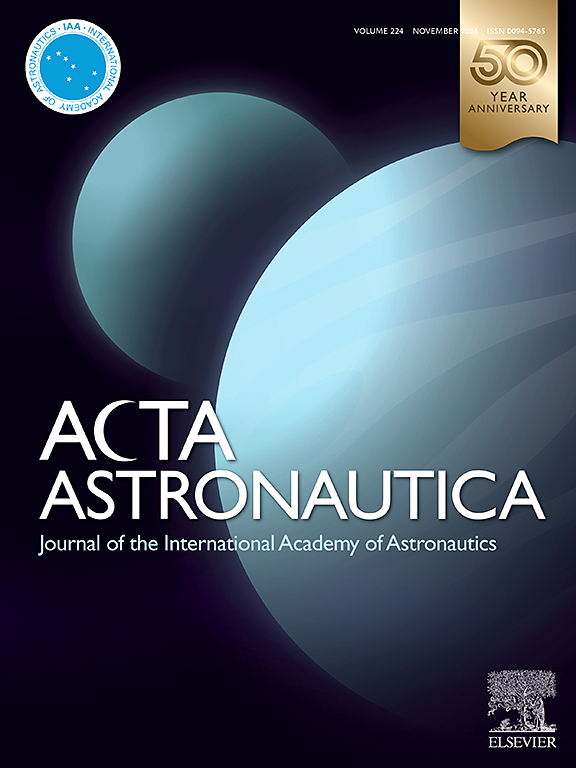一种应用于正交概率逼近的轨道不确定性传播验证框架
IF 3.1
2区 物理与天体物理
Q1 ENGINEERING, AEROSPACE
引用次数: 0
摘要
本文提出了一个使用不确定性传播技术的数据验证框架,用于空间态势感知(SSA)应用。特别是,我们验证了一种新的不确定性传播技术,在这里被称为正交概率近似(OPA)。这种技术描述了非线性动力系统在未来时间的状态/参数不确定性的演变,例如初始条件和/或阻力系数。这种新的不确定性量化方法采用Liouville定理和Chebyshev多项式近似来创建未来感兴趣时间的概率密度函数(PDF)的函数表示,其计算成本仅为经典高保真不确定性传播方法的一小部分。首先将OPA与多项式混沌展开和蒙特卡罗模拟进行了比较,数值验证了该方法的准确性。对于实际数据验证,使用了两个卫星数据来源:来自喷气推进实验室(JPL)数据库的GRACE导航数据和洛克希德·马丁公司提供的FireOPAL地基观测仪。在该验证框架中,驻留空间目标(rso)的状态/参数不确定性在不使用任何测量的情况下通过OPA传播。利用GRACE导航数据(LEO精确定轨)、FireOPAL传感器跟踪数据(GEO case)和Block-DM卫星高椭圆轨道(HEO)火箭体的Yamal - 202和FireOPAL传感器跟踪数据,成功验证了基于OPA的RSO状态的最大似然估计和不确定性边界。结果表明,在没有连续测量的情况下,OPA能够准确地估计rso的状态,此外,所提出的框架可以用于验证任何不确定性传播技术。本文章由计算机程序翻译,如有差异,请以英文原文为准。
A validation framework for orbit uncertainty propagation using real satellite data applied to orthogonal probability approximation
This paper presents a validation framework using data for uncertainty propagation techniques for space situational awareness (SSA) applications. In particular, we validate a novel technique for uncertainty propagation, dubbed here as Orthogonal Probability Approximation (OPA) This technique describes the evolution of state/parameter uncertainties, e.g. initial condition and/or drag coefficient, of nonlinear dynamical systems at a future time. This new uncertainty quantification method employs Liouville’s theorem and Chebyshev polynomial approximation to create a functional representation of the probability density function (PDF) at the future time of interest at a fraction of the computational cost of classical high-fidelity uncertainty propagation methods. OPA is first compared against Polynomial Chaos Expansions and Monte-Carlo simulations to numerically demonstrate the accuracy of the method. For the real data validation, two sources of satellite data are used: GRACE navigation data from the Jet Propulsion Laboratory (JPL) database, and FireOPAL ground-based observer provided by Lockheed Martin. In the presented validation framework, the state/parameter uncertainties of resident space objects (RSOs) are propagated by OPA without using any measurements. The maximum likelihood estimate and the uncertainty bounds of the RSO state from OPA are compared with documented estimates and uncertainty bounds obtained from real satellite/object tracking data as well as other uncertainty propagation methods Results indicate successful validation using GRACE navigation data (precise orbit determination in LEO), and FireOPAL sensor tracking data for Yamal 202 (GEO case) and a rocket body of Block-DM satellite with highly elliptical orbit (HEO). The results show the capability of OPA to accurately estimate the states of RSOs in the absence of continuous measurements, and, in addition, the presented framework can be used to validate any uncertainty propagation technique.
求助全文
通过发布文献求助,成功后即可免费获取论文全文。
去求助
来源期刊

Acta Astronautica
工程技术-工程:宇航
CiteScore
7.20
自引率
22.90%
发文量
599
审稿时长
53 days
期刊介绍:
Acta Astronautica is sponsored by the International Academy of Astronautics. Content is based on original contributions in all fields of basic, engineering, life and social space sciences and of space technology related to:
The peaceful scientific exploration of space,
Its exploitation for human welfare and progress,
Conception, design, development and operation of space-borne and Earth-based systems,
In addition to regular issues, the journal publishes selected proceedings of the annual International Astronautical Congress (IAC), transactions of the IAA and special issues on topics of current interest, such as microgravity, space station technology, geostationary orbits, and space economics. Other subject areas include satellite technology, space transportation and communications, space energy, power and propulsion, astrodynamics, extraterrestrial intelligence and Earth observations.
 求助内容:
求助内容: 应助结果提醒方式:
应助结果提醒方式:


